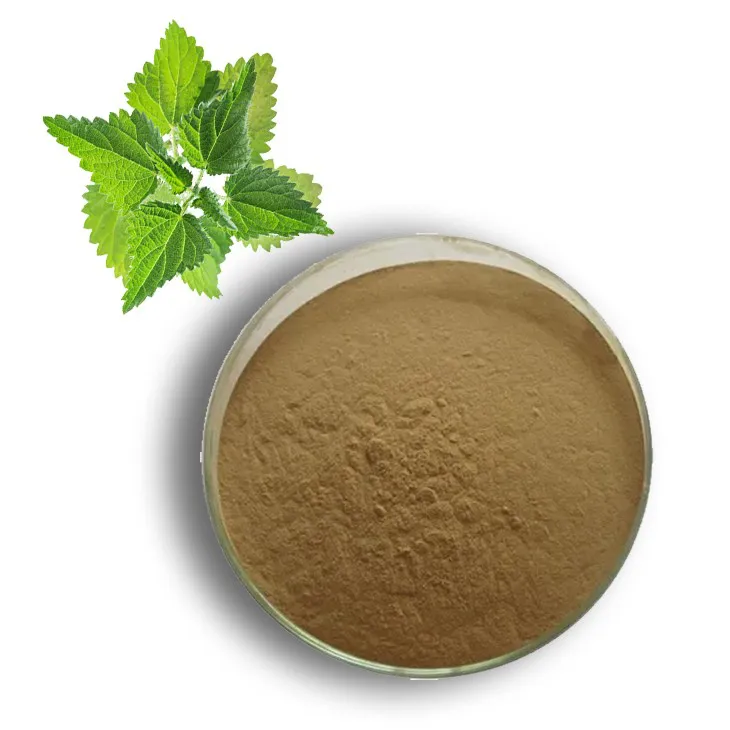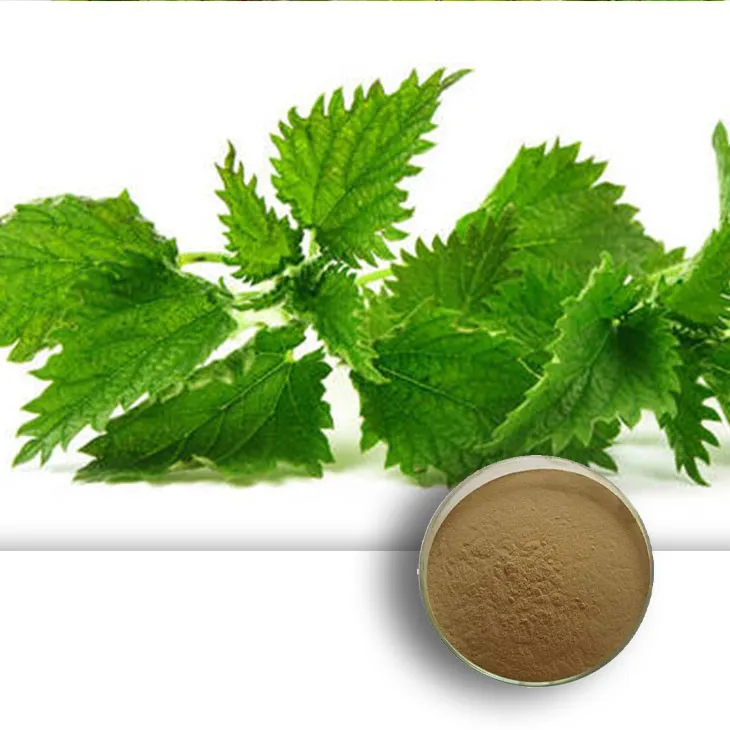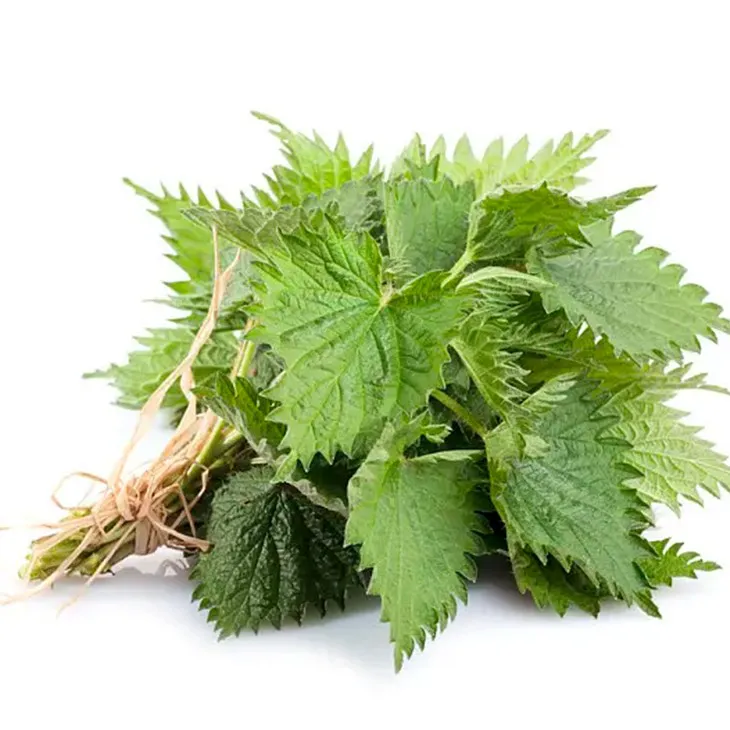- 0086-571-85302990
- sales@greenskybio.com
5 Benefits of Nettle Leaf Extract + Dosage, Side Effects
2024-11-11

Introduction
Nettle leaf extract has been used for centuries in traditional medicine. It is derived from the stinging nettle plant (Urtica dioica). In recent years, it has gained significant attention in the Western world as a natural remedy with various potential health benefits. This article will explore five of its main benefits, as well as the proper dosage and possible side effects.

Benefit 1: Anti - inflammatory Properties
1. Inflammation and its impact
- Inflammation is a natural response of the body's immune system to injury or infection. However, chronic inflammation can lead to various health problems such as arthritis, heart disease, and certain types of cancer.
- Modern lifestyles, including a diet high in processed foods and sedentary habits, can contribute to increased levels of inflammation in the body.
- Nettle leaf extract contains several compounds that have anti - inflammatory properties. For example, it has flavonoids, phenolic acids, and fatty acids.
- Studies have shown that these compounds can inhibit the production of inflammatory mediators such as cytokines and prostaglandins. This can help reduce inflammation in the body at a cellular level.
- Some research has indicated that nettle leaf extract may be particularly effective in reducing joint inflammation in conditions like rheumatoid arthritis. It may help relieve pain and improve joint mobility in patients.

Benefit 2: Allergy Relief
1. Allergies and the immune response
- Allergies occur when the immune system overreacts to harmless substances such as pollen, dust mites, or certain foods. This overreaction leads to symptoms like sneezing, itching, and a runny nose.
- The immune system releases histamine during an allergic reaction, which is responsible for many of the uncomfortable symptoms.
- Nettle leaf extract has been shown to have anti - histamine properties. It can block the release of histamine from mast cells, which are cells involved in the allergic response.
- Some people use nettle leaf extract in the form of tea or supplements during allergy seasons to relieve symptoms. It may be an alternative or complementary approach to traditional anti - allergy medications for some individuals.
- However, it should be noted that while it may provide relief for mild allergy symptoms, it may not be sufficient for severe allergic reactions, and medical attention should still be sought in such cases.

Benefit 3: Blood Sugar Regulation
1. The importance of blood sugar regulation
- Maintaining stable blood sugar levels is crucial for overall health. High blood sugar levels over time can lead to diabetes and its associated complications, such as nerve damage, kidney problems, and vision impairment.
- Insulin is the hormone responsible for regulating blood sugar levels, and problems with insulin production or function can disrupt this balance.
- Nettle leaf extract may help regulate blood sugar levels. Some studies suggest that it can improve insulin sensitivity in the body.
- It may also help slow down the absorption of carbohydrates in the digestive tract, which can prevent rapid spikes in blood sugar after a meal.
- However, more research is needed to fully understand its mechanisms and effectiveness in blood sugar regulation, and it should not be used as a substitute for medical treatment for diabetes without consulting a healthcare provider.
Benefit 4: Prostate Health
1. Common prostate problems
- The prostate gland is an important part of the male reproductive system. As men age, they are more likely to experience prostate problems such as benign prostatic hyperplasia (BPH) and prostate cancer.
- BPH is a non - cancerous enlargement of the prostate gland that can cause urinary symptoms like frequent urination, difficulty starting and stopping urination, and a weak urine stream.
- Nettle leaf extract has been studied for its potential benefits in prostate health. Some research suggests that it may help reduce the symptoms associated with BPH.
- It may work by inhibiting the growth of prostate cells or by reducing inflammation in the prostate gland. However, more clinical trials are needed to confirm these effects.
Benefit 5: Skin Health
1. Skin conditions and their causes
- The skin is the largest organ of the body and is exposed to various environmental factors that can cause problems. Conditions such as eczema, psoriasis, and acne are common skin disorders that can be caused by factors like genetics, hormonal imbalances, and environmental irritants.
- Inflammation also plays a role in many skin conditions, as it can lead to redness, itching, and discomfort.
- Nettle leaf extract's anti - inflammatory properties can be beneficial for skin health. It may help reduce inflammation in skin conditions, thereby alleviating symptoms like redness and itching.
- It is also rich in vitamins and minerals such as vitamin C, vitamin K, and iron, which are important for skin health. Vitamin C, for example, is involved in collagen synthesis, which is essential for maintaining the skin's elasticity.
- Some people use nettle leaf extract in topical formulations or consume it orally to improve their skin health, although more research is needed to determine its full effectiveness in treating specific skin conditions.
Dosage
1. Determining the appropriate dosage
- The appropriate dosage of nettle leaf extract can vary depending on several factors, including the form of the extract (e.g., capsules, tincture, or tea), the purpose of use, and the individual's health status.
- When using nettle leaf extract in the form of tea, a common recommendation is to steep 1 - 2 teaspoons of dried nettle leaves in a cup of hot water for 10 - 15 minutes and drink it up to three times a day.
- For nettle leaf extract capsules, the typical dosage may range from 300 - 1200 mg per day, but it is important to follow the instructions on the product label or consult a healthcare provider.
- If using nettle leaf extract for a specific health condition, it may be necessary to adjust the dosage over time based on the individual's response. For example, if using it for allergy relief and not experiencing sufficient relief at the initial dosage, a healthcare provider may recommend increasing the dosage gradually within a safe range.
- However, it is crucial not to exceed the recommended maximum dosage, as high doses may increase the risk of side effects.
Side Effects
1. Mild side effects
- Some people may experience mild side effects when taking nettle leaf extract. These can include gastrointestinal symptoms such as nausea, stomach upset, and diarrhea. These side effects are usually mild and may subside on their own if the dosage is adjusted or the supplement is discontinued.
- Allergic reactions to nettle leaf extract are also possible, although they are relatively rare. Symptoms of an allergic reaction may include rash, itching, swelling, and difficulty breathing. If any of these symptoms occur, medical attention should be sought immediately.
- Nettle leaf extract may interact with certain medications. For example, it may potentiate the effects of blood - thinning medications such as warfarin, increasing the risk of bleeding. Therefore, it is important to inform your healthcare provider if you are taking nettle leaf extract, especially if you are on other medications.
- It may also interact with medications for diabetes or high blood pressure, so caution is advised when using nettle leaf extract in combination with these drugs.
Conclusion
Nettle leaf extract offers several potential health benefits, including anti - inflammatory effects, allergy relief, blood sugar regulation, prostate health support, and skin health improvement. However, it is important to use it correctly and be aware of the possible side effects and interactions. As with any natural remedy, it should not be used as a substitute for medical advice or treatment in serious health conditions. Consult a healthcare provider before starting to use nettle leaf extract, especially if you have pre - existing health problems or are taking other medications.
FAQ:
What are the main benefits of nettle leaf extract?
Nettle leaf extract has several benefits. Firstly, it may have anti - inflammatory properties, which can help in reducing inflammation in the body. Secondly, it might support urinary health by promoting healthy urine flow. Thirdly, it could potentially boost the immune system, making the body more resistant to diseases. Fourthly, it may have antioxidant effects, helping to fight against free radicals in the body. Finally, it may also assist in improving skin health, for example, by reducing skin irritations.
How should nettle leaf extract be dosed?
The dosage of nettle leaf extract can vary depending on various factors such as the form of the extract (e.g., capsule, tincture) and the intended use. In general, for a nettle leaf extract in capsule form, a typical dosage might be around 300 - 600 mg per day. However, it is always best to consult a healthcare provider before starting any new supplement regimen to ensure the proper dosage for your individual situation.
What are the possible side effects of nettle leaf extract?
Some possible side effects of nettle leaf extract include mild gastrointestinal discomfort such as stomach upset, nausea, or diarrhea in some individuals. Also, in rare cases, skin rashes or allergic reactions may occur, especially in those who are allergic to plants in the Urticaceae family. If any adverse reactions are experienced, it is important to stop using the extract and seek medical advice.
Can nettle leaf extract interact with medications?
Yes, nettle leaf extract may interact with certain medications. For example, it may interact with medications for blood pressure or diabetes. It could potentially affect the way these medications work in the body. Therefore, if you are taking any prescription medications, it is crucial to inform your doctor before using nettle leaf extract to avoid any potential harmful interactions.
Is nettle leaf extract suitable for everyone?
Nettle leaf extract is not suitable for everyone. Pregnant and breastfeeding women should avoid it as there is not enough research to determine its safety in these situations. Also, people with known allergies to nettles or related plants should not use it. Additionally, those with certain medical conditions such as kidney problems may need to be cautious and consult a doctor before using it.
Related literature
- The Health Benefits of Nettle Leaf Extract: A Comprehensive Review"
- "Nettle Leaf Extract: Dosage, Safety, and Efficacy in Natural Medicine"
- "Side Effects and Interactions of Nettle Leaf Extract: An Evidence - Based Analysis"
- ▶ Hesperidin
- ▶ citrus bioflavonoids
- ▶ plant extract
- ▶ lycopene
- ▶ Diosmin
- ▶ Grape seed extract
- ▶ Sea buckthorn Juice Powder
- ▶ Beetroot powder
- ▶ Hops Extract
- ▶ Artichoke Extract
- ▶ Reishi mushroom extract
- ▶ Astaxanthin
- ▶ Green Tea Extract
- ▶ Curcumin Extract
- ▶ Horse Chestnut Extract
- ▶ Other Problems
- ▶ Boswellia Serrata Extract
- ▶ Resveratrol Extract
- ▶ Marigold Extract
- ▶ Grape Leaf Extract
- ▶ blog3
-
High purity olive leaf extract
2024-11-11
-
Lavender oil extraction method
2024-11-11
-
100% organic virgin sea buckthorn fruit oil
2024-11-11
-
Lotus leaf extract powder factory in China
2024-11-11
-
China aged garlic extract supplier
2024-11-11
-
Deer antler extract powder manufacturer
2024-11-11
-
Saw palmetto extract vs whole herb
2024-11-11
-
Dan Shen Root Extract/Salvia Root Extract
2024-11-11
-
Tormentil Extract
2024-11-11
-
Epimedium extract powder
2024-11-11
-
Citrus Aurantii Extract
2024-11-11
-
Cassia Seed Extract
2024-11-11
-
Moringa powder
2024-11-11
-
Angelica sinensis extract
2024-11-11
-
Beta Carotene
2024-11-11
-
Curcumin Extract
2024-11-11
-
Alfalfa Meal
2024-11-11





















